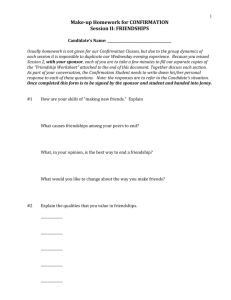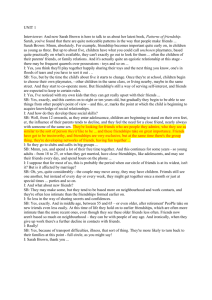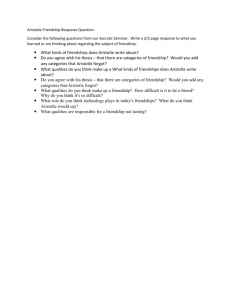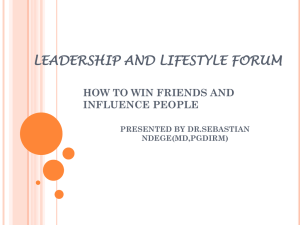Aristotle on Dissolving Friendships
advertisement
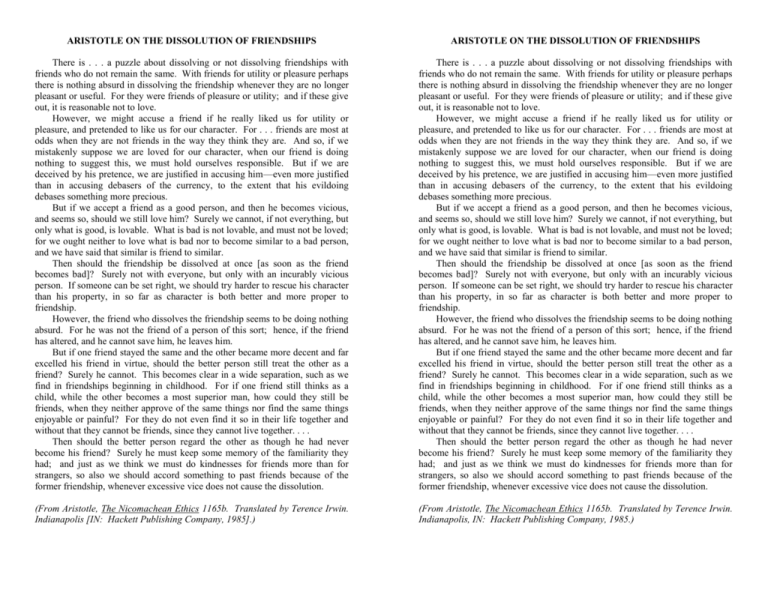
ARISTOTLE ON THE DISSOLUTION OF FRIENDSHIPS ARISTOTLE ON THE DISSOLUTION OF FRIENDSHIPS There is . . . a puzzle about dissolving or not dissolving friendships with friends who do not remain the same. With friends for utility or pleasure perhaps there is nothing absurd in dissolving the friendship whenever they are no longer pleasant or useful. For they were friends of pleasure or utility; and if these give out, it is reasonable not to love. However, we might accuse a friend if he really liked us for utility or pleasure, and pretended to like us for our character. For . . . friends are most at odds when they are not friends in the way they think they are. And so, if we mistakenly suppose we are loved for our character, when our friend is doing nothing to suggest this, we must hold ourselves responsible. But if we are deceived by his pretence, we are justified in accusing him—even more justified than in accusing debasers of the currency, to the extent that his evildoing debases something more precious. But if we accept a friend as a good person, and then he becomes vicious, and seems so, should we still love him? Surely we cannot, if not everything, but only what is good, is lovable. What is bad is not lovable, and must not be loved; for we ought neither to love what is bad nor to become similar to a bad person, and we have said that similar is friend to similar. Then should the friendship be dissolved at once [as soon as the friend becomes bad]? Surely not with everyone, but only with an incurably vicious person. If someone can be set right, we should try harder to rescue his character than his property, in so far as character is both better and more proper to friendship. However, the friend who dissolves the friendship seems to be doing nothing absurd. For he was not the friend of a person of this sort; hence, if the friend has altered, and he cannot save him, he leaves him. But if one friend stayed the same and the other became more decent and far excelled his friend in virtue, should the better person still treat the other as a friend? Surely he cannot. This becomes clear in a wide separation, such as we find in friendships beginning in childhood. For if one friend still thinks as a child, while the other becomes a most superior man, how could they still be friends, when they neither approve of the same things nor find the same things enjoyable or painful? For they do not even find it so in their life together and without that they cannot be friends, since they cannot live together. . . . Then should the better person regard the other as though he had never become his friend? Surely he must keep some memory of the familiarity they had; and just as we think we must do kindnesses for friends more than for strangers, so also we should accord something to past friends because of the former friendship, whenever excessive vice does not cause the dissolution. There is . . . a puzzle about dissolving or not dissolving friendships with friends who do not remain the same. With friends for utility or pleasure perhaps there is nothing absurd in dissolving the friendship whenever they are no longer pleasant or useful. For they were friends of pleasure or utility; and if these give out, it is reasonable not to love. However, we might accuse a friend if he really liked us for utility or pleasure, and pretended to like us for our character. For . . . friends are most at odds when they are not friends in the way they think they are. And so, if we mistakenly suppose we are loved for our character, when our friend is doing nothing to suggest this, we must hold ourselves responsible. But if we are deceived by his pretence, we are justified in accusing him—even more justified than in accusing debasers of the currency, to the extent that his evildoing debases something more precious. But if we accept a friend as a good person, and then he becomes vicious, and seems so, should we still love him? Surely we cannot, if not everything, but only what is good, is lovable. What is bad is not lovable, and must not be loved; for we ought neither to love what is bad nor to become similar to a bad person, and we have said that similar is friend to similar. Then should the friendship be dissolved at once [as soon as the friend becomes bad]? Surely not with everyone, but only with an incurably vicious person. If someone can be set right, we should try harder to rescue his character than his property, in so far as character is both better and more proper to friendship. However, the friend who dissolves the friendship seems to be doing nothing absurd. For he was not the friend of a person of this sort; hence, if the friend has altered, and he cannot save him, he leaves him. But if one friend stayed the same and the other became more decent and far excelled his friend in virtue, should the better person still treat the other as a friend? Surely he cannot. This becomes clear in a wide separation, such as we find in friendships beginning in childhood. For if one friend still thinks as a child, while the other becomes a most superior man, how could they still be friends, when they neither approve of the same things nor find the same things enjoyable or painful? For they do not even find it so in their life together and without that they cannot be friends, since they cannot live together. . . . Then should the better person regard the other as though he had never become his friend? Surely he must keep some memory of the familiarity they had; and just as we think we must do kindnesses for friends more than for strangers, so also we should accord something to past friends because of the former friendship, whenever excessive vice does not cause the dissolution. (From Aristotle, The Nicomachean Ethics 1165b. Translated by Terence Irwin. Indianapolis [IN: Hackett Publishing Company, 1985].) (From Aristotle, The Nicomachean Ethics 1165b. Translated by Terence Irwin. Indianapolis, IN: Hackett Publishing Company, 1985.)

